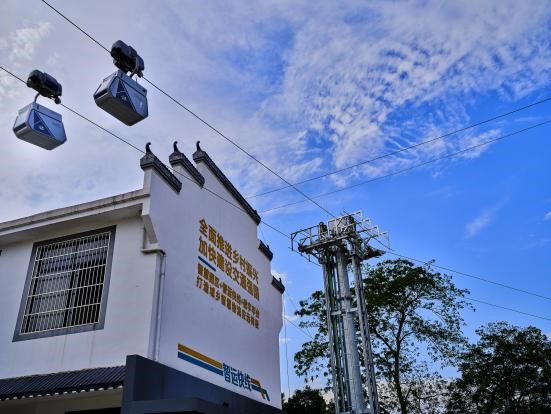Smart retail solutions bring tailored services to Chinese consumers (2)
With the rapid development of big data, AI, and cloud computing, China’s retail sector is witnessing a growing trend toward digitalization and intelligentization, or a smart retail revolution, in every link of the industrial chain, from manufacturing, storage and purchase, to sale and service.
Smart retail usually refers to a retail pattern that uses Internet and Internet of Things (IoT) technologies to perceive consumption habits and predict consumption trends for the purpose of guiding production and manufacturing and providing diversified and personalized products and services for consumers.
Unmanned supermarkets, placing orders via mini program, “trying on” clothes with the help of virtual reality (VR) devices, and smart supply chain management all fall into smart retail application scenarios. Meanwhile, everyone involved in the front end, mid end, and back end of the retail trade, including producer, purchaser, manager of shopping mall, store manager, and consumer, is a part of smart retail.
It’s generally believed by practitioners in the industry that the ultimate goal of smart retail is realizing the integration of online and offline business.
The development of smart retail can help offline business realize digitalization and online transaction and make offline retail business be searched and recommended online, said Lin Yuanqing, founder of Aibee, a Beijing-based AI company focusing on applying digitalized and intelligent AI solutions to the physical world.
Smart retail will enable consumers to search for brick-and-mortar stores and discount coupons as convenient as with online shops, according to Lin, who believes that in the future, consumers will enjoy convenience and pleasure in shopping to the greatest extent in different scenarios, whether online or offline.
On the one hand, smart retail practitioners aim to formulate diversified and personalized marketing strategies and provide targeted services for consumers based on accurate judgment on their consumption behavior with the help of big data analysis. On the other hand, by feeding data to the purchase and delivery chains, smart retail solutions help realize production and supply of goods with lower costs, higher efficiency, and more flexible means, said experts.
In Chengdu, capital of southwest China’s Sichuan province, a citizen surnamed Wang quickly found a parking spot at an underground parking lot of a shopping mall via an app of the mall. After entering the mall, Wang scanned an interactive screen with his mobile phone, selected the store he wanted to go, and immediately saw a VR guide on his phone. He then followed the guide to the store without having to waste time walking around in circles to look for it.
The scenes described above are happening in more and more retail locations across China. Thanks to the application of AI technologies related to computer vision, big data analysis, robot, and speech recognition, many traditional department stores and supermarket chains have undergone digital and intelligent transformations and are now able to ensure all-round smart services for consumers.
“In traditional warehouses, it takes about three hours to prepare the goods on each order before delivery. Now we have reduced the preparation time for each order to three to five minutes, and are able to sort up to 2,000 items an hour during peak period. Our sorting costs of each item have been cut by 50 percent, and we have optimized the storage structure, accelerated inventory turnover, and reduced the risk of dead stock,” said Jing Wei, CEO of the IT headquarters of Chinese retail giant Suning.
Through continuous science and technology-oriented transformation and input, the company has achieved rich fruits in the digitalization of its supply chain and made the greatest possible efforts it could to integrate smart technologies into the selection of goods and inventory management according to the needs of consumers, according to Jing.
In the digital and intelligent transformations of the retail industry, every element, including people, goods, and locations, is not isolated from each other, but releases a huge amount of data value after their information is interrelated and integrated, said experts, explaining that these elements can help business owners tap into the law of consumption, guide production with consumer needs, and facilitate adjustments to supply chain and manufacturing links.
 |  |
Photos
Related Stories
- Hong Kong's retail sales up mildly from January to February
- China's retail sales up 33.8 pct in first two months
- China's retail sales down 20.5 pct in first two months as virus hurts economy
- Opportunity looms to Chinese retailers despite epidemic outbreak: report
- China's retail sales rebound over efforts to contain coronavirus
- Innovation to boost online and offline retail in China
- Beijing's retail sales up 4.4 pct in 2019
- China's retail sales up 8 pct in first 11 months
- China's retail sales up 8.3 pct in Q1
- 80 percent of China's government and retail services to go digital in 5 years: report
Copyright © 2021 People's Daily Online. All Rights Reserved.











